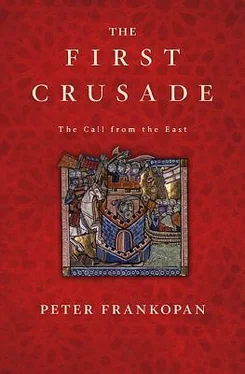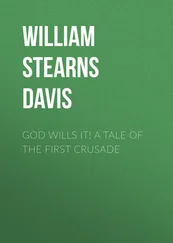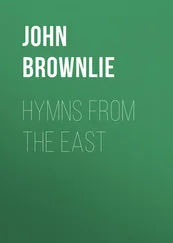The collapse of Kerbogha’s army may well have seemed miraculous to the Crusaders, but there were more mundane reasons for the triumph. The confusion that quickly spread through the Turkish army was the result of incompetent leadership and poor communication. This gave way to panic, as limited Crusader operations, in some cases simply holding positions, gave the impression that the Muslim army was being driven back. In the chaos of combat, with dust being kicked up by the hooves of horses and the noise of clashing metal and battle cries filling the air, the already excitable Turkish army was undermined by its own size, with multiple commanders on the field trying to ascertain what was going on, while trying to take orders from Kerbogha.
The Crusader force, nimble, disciplined and well led, owed their most stunning success so far to their ability to hold their ground. The westerners had now repelled three major Muslim armies and gained permanent control of Antioch. They had nothing left to fear; and they needed no further signs that God was truly with them. It was a matter of course, surely, that the Holy City itself would be returned to Christian hands.
The aftermath of the battle for Antioch saw the Crusade leaders take stock of their position. They decided that the advance south to Jerusalem would not take place until the winter, to allow the expedition to consolidate and recover its strength. Morale was further boosted by the surrender of Antioch’s citadel in the wake of Kerbogha’s defeat, and by the support the Crusaders received from those living in the surrounding area, which began to supply the new overlords of the city.
There was, however, more to the decision to delay the march on Jerusalem than allowing time to regroup. The Chronicler Raymond of Aguilers, for one, was keen for the Crusaders to push on. He was certain that they would be unopposed if they marched directly on the Holy City, arguing that the populations of Syria and Palestine were so scared and weak after the defeat of Kerbogha that no one would dare even throw a stone at the western knights if they marched now. 46In fact, the delay was caused by confusion and disagreement over what should happen to Antioch. With the city captured, the practicalities of occupation began to bog down the Crusaders. How would control of this city, and of other towns, forts and locations, be maintained? Under whose auspices and authority should they fall? What was reasonable to expect from the local population in terms of food supply and co-operation – especially when they were Muslims? Who could claim personal overlordship of towns beyond Byzantium’s frontiers? Was the purpose of the expedition as a whole the liberation of Jerusalem alone – or were there other goals to consider? The months that followed the defeat of Kerbogha were taken up with a struggle for the soul of the First Crusade.
Central to this crisis was the emerging stand-off between Bohemond, who was clamouring for personal control of Antioch, and Raymond of Toulouse, who insisted that oaths to Alexios should be obeyed and was adamant that the expedition’s integrity as an armed pilgrimage – rather than a campaign of conquest – should be respected. The result was a stalemate. Bohemond refused to leave Antioch; Raymond refused to set out for Jerusalem until Bohemond agreed to relinquish his claims.
The Crusade began to disintegrate. The leaders of the expedition had previously shown remarkable solidarity, both in battle and in council. But after the capture of Antioch, competing ambitions threatened the viability of the enterprise. An extraordinary announcement was made soon after the defeat of Kerbogha that all taking part in the expedition were free to take service with whichever lord they wished; it was an open admission of how divided the campaign had become. It meant that all the traditional ties, bonds and loyalties that had had so much value in the west had not only loosened but were removed altogether. This dramatic volte-face worked largely in Raymond’s favour; his popularity and honourable reputation did much to recommend him to those not already serving with him. 47One who joined him was author of the Gesta Francorum who had accompanied Bohemond from southern Italy but had grown frustrated with the delay in heading for Jerusalem.
Other Crusaders also looked to benefit from the unravelling situation. A number of knights and foot soldiers, left impoverished by the long siege at Antioch, made for Edessa, drawn by Baldwin’s promises of financial reward in return for service. 48Baldwin’s brother Godfrey, meanwhile, set about capturing local forts and towns, such as TellBashir, extracting levies from the inhabitants which he shared with his men. 49This increased his popularity and attracted others into his fold. Even low-ranking knights seized the opportunity. Raymond Pilet assembled a force with the promise of easy pickings and headed into the fertile Jabal as-Summaq plateau. After initial success, the expedition ended in disaster, all but annihilated in an ill-advised assault on the town of Maarrat an-Numan in July 1098. 50
The First Crusade was in freefall. What the expedition needed now was strong and decisive leadership but instead dissent started to swell, at first in private and then in public. Rumours began to spread that the rank-and-file participants might take matters into their own hands and tear down the walls of Antioch to bring the leaders to their senses. It is hard to think of a more dramatic course of action than to destroy the prize that had been won at such great cost. But their anger was understandable: disagreement over Antioch was the cause of the problems. 51
To overcome the impasse, the Crusaders turned to Emperor Alexios. As we have seen, when Kerbogha approached Antioch, a delegation led by Stephen of Blois had been sent to the emperor begging him to march at the head of the imperial army to relieve the western force. Stephen found Alexios at Philomelion and asked for a private meeting with him. His summary of how things looked could barely have been more bleak: ‘I tell you truly that Antioch has been taken but the citadel has not fallen and our men are all closely besieged; I expect that by this time they have been killed by the Turks. Retreat therefore as fast as you can, in case they also catch up with you.’ 52Stephen and others reported that in all probability, Kerbogha had already arrived at the city and slaughtered the besieged knights. Antioch was likely back in Turkish hands, and the Crusade at a bloody finale. This hardly encouraged the emperor to march across to the Crusaders’ aid. With an agreement already reached with Kilidj Arslan in western Asia Minor following the success of the Byzantine campaign of 1097–8, he sounded the call for the imper ial forces to return to Constantinople. 53
Unaware of the emperor’s decision, rumours circulated for several months after the fall of Antioch that Alexios’ arrival in the east was imminent. 54In the meantime the absence of a senior Byzantine representative created a vacuum. In the case of Nicaea and elsewhere, a Byzantine appointee – men such as Manuel Boutoumites, Peter Aliphas, Welf of Burgundy and Baldwin of Bouillon – had stepped forward to take control of the situation. There was no such figure in Antioch, and without the emperor to look to for instruction and guidance, the Crusaders were at a loss.
To break the deadlock, a second embassy was sent to Alexios, again led by a senior figure in the Crusader army, with the aim of persuading the Byzantine ruler to take control of the expedition. In the late summer of 1098, ‘our leaders, Duke Godfrey, Raymond Count of Saint-Gilles, Bohemond, the Count of Normandy and the Count of Flanders and all the others sent the high-born knight Hugh the Great to the emperor at Constantinople asking him to come and take over the city and fulfil the obligations which he had undertaken towards them’. 55Although one source suggests that Hugh of Vermandois behaved aggressively towards Alexios when he met him in Constantinople, it seems much more likely that he was placatory. But if Hugh did intimate, gently or otherwise, that unless the emperor came to Antioch to assume leadership of the expedition there would be devastating consequences, then it had little effect. Alexios would not head east. 56
Читать дальше











